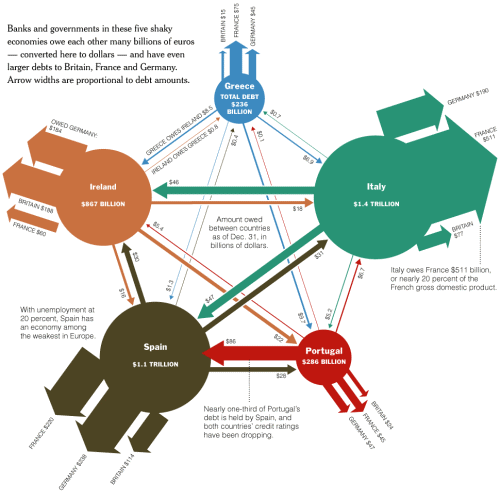
by Nelson D.Schwartz
April 30, 2010
from
NewYorkTimes Website
Despite the best efforts of the
International Monetary Fund, the financial
crisis in Europe seems full of suspense.
Will Germany and the European Union actually
cough up the money to help bail out Greece, which is on the edge of a
financial meltdown? Will the contagion spread to other vulnerable countries,
like Portugal and Spain?
But like some mystery novels where the ending is telegraphed in the opening
pages, the denouement will probably be unsurprising. For all the
hand-wringing, the reality is that the Germans, the French and the rest of
Europe have little choice. In the decade since the introduction of the Euro,
the economies on the continent have become increasingly interwoven.
With cross-border banking and borrowing, many
countries on the periphery of Europe owe vast sums to one another, as well
as to richer neighbors (?) like Germany and France - read below
insert.
|
Top German Bankers See Plot To Funnel Bailout
Money To French Banks
by Joe Weisenthal
Business Insider
May 30, 2010
from
PrisonPlanet Website
From the beginning, it’s been clear that the bailout of Greece would
be a bailout in large part of French banks, owing in part to the
fact that French banks had the biggest exposure.
Yet apparently some top German bankers are alarmed at how things are
playing out.
A report in Der Spiegel (in German) suggests that top Bundesbank
bankers see a “plot” underway at
the ECB.
From Google Translate
Germany’s top bankers are confused: € 25 billion, the ECB has so far
spent on Greek government bonds. According to SPIEGEL information
suggested the Bundesbank, that is served chiefly to Paris - so
French Institute could get rid of their scrap paper.
Here’s what they’re upset about: The ECB is buying up Greek debt
(largely from French banks), but the Germans don’t understand why.
After all, Greece has already
received its bailout money already ; Greece should be able to pay
back its debt in full.
Why, then, do French banks need to offload its junk paper?
Beyond the fact that the French have the biggest exposure, there’s
another reason why the French may be winning bag:
Some senior central bankers do suspect a French plot, after all, ECB
chief Jean-Claude Trichet, a Frenchman, under pressure from French
President Nicolas Sarkozy revealed an iron rule of the monetary base
- that is never to buy government bonds from Member States.
Throw in another Frenchman, the IMF’s Dominique Strauss-Kahn, and
you have all the right people in power. |

Like the alliances that drew one country after
another into World War I, a default by a single nation would send other
countries tumbling.
If that message was lost on anyone, there was a
reminder last Tuesday when Standard & Poor’s downgrade of Spanish and
Portuguese debt hammered stock markets everywhere, including in the United
States.
The first domino is Greece. It owes nearly $10 billion to Portuguese banks,
and with Portugal already falling two notches in S.& P.’s ratings and
facing higher borrowing costs, a default by Greece would be a staggering
blow. Portugal, in turn, owes $86 billion to banks in Spain; Spain’s debt
was downgraded one notch last week.
The numbers quickly mount.
Ireland is heavily indebted to Germany and
Britain. The exposure of German banks to Spanish debt totals $238 billion,
according to the Bank for International Settlements, while French banks hold
another $220 billion.
And Italy, whose finances are perennially shaky,
is owed $31 billion by Spain and owes France $511 billion, or nearly 20
percent of the French gross domestic product.
“This is not a bailout of Greece,” said Eric
Fine, who manages Van Eck G-175 Strategies, a hedge fund specializing in
currencies and emerging market debt. “This is a bailout of the Euro
system.”
Solutions are also not easily forthcoming.
“In the end, we’re all saying we don’t know
how to deal with it,” said Dirk Hoffmann-Becking, a bank analyst with
Alliance Bernstein in London. “We don’t know how the channels work, or
where the problems will pop up next.”

